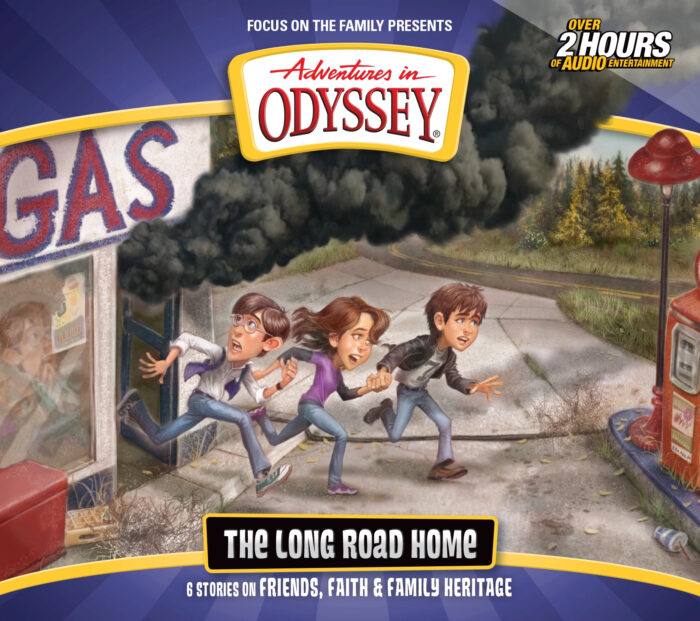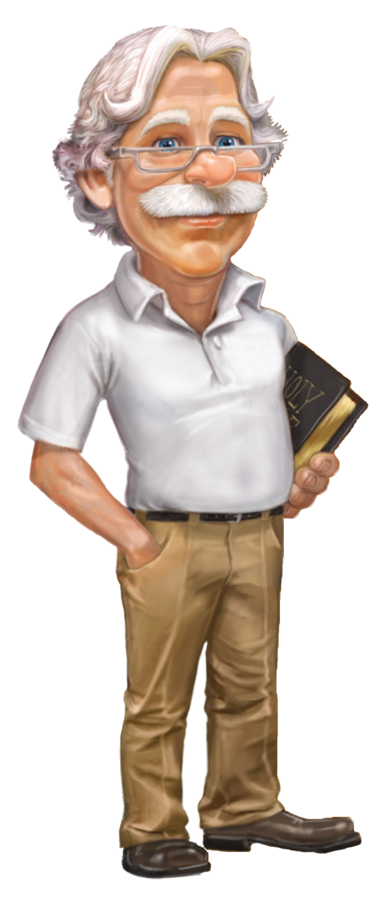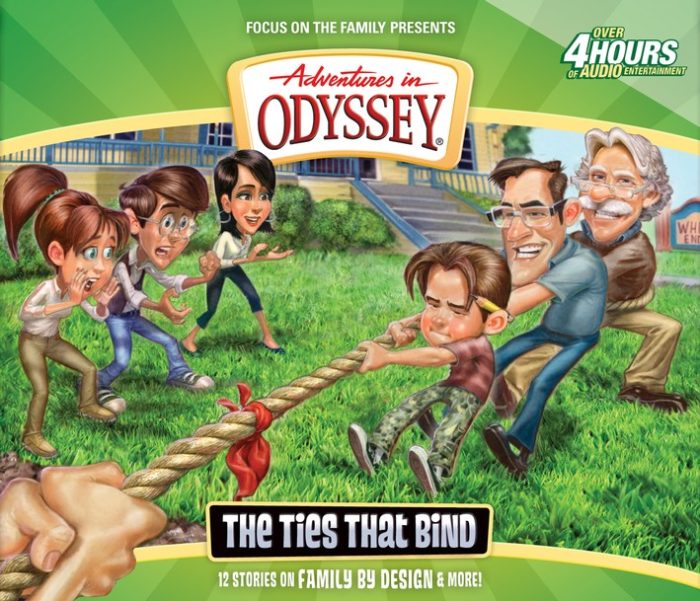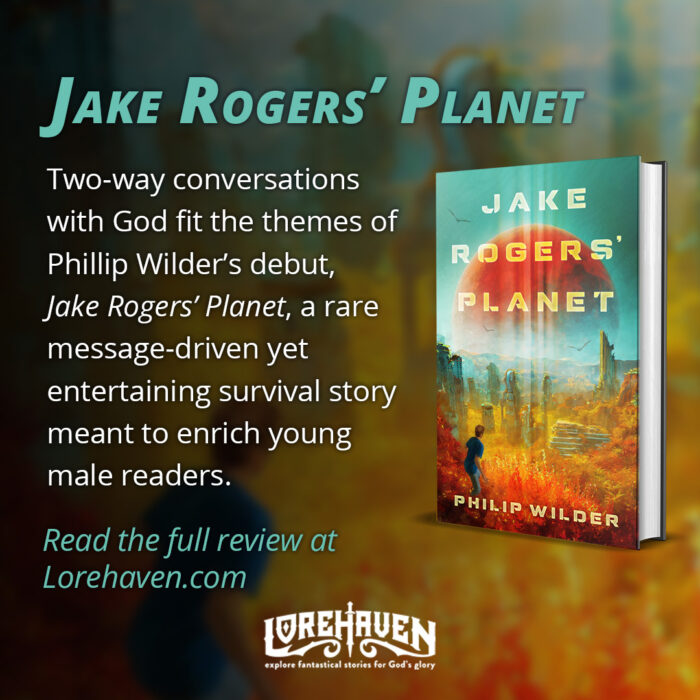God Used ‘Adventures in Odyssey’ to Shape My Life Beyond Childhood
You’re about to travel to a place of wonder, excitement, and rediscovery of the best audio drama Christians ever made: Adventures in Odyssey.1
Just a few years ago, I finally rediscovered this “childhood” favorite.
Yes, the long-running audio series’ official target audience is ages eight through twelve. But back in the ’90s, I continued listening to the series well into my teen years. In fact, I could write a whole article simply exploring how Adventures in Odyssey, perhaps more than any other story series, planted in me a desire to train my imagination for God’s glory.
 How I returned to Adventures in Odyssey
How I returned to Adventures in Odyssey
Already I have asked myself: How could I have joined the ranks of those dreaded Christian teenagers? Those traitors? Those maladjusted evangelicals who once told me (in my early teens) that sure, they had once listened to Odyssey, but somehow wandered away?
My treason was based in reasons similar to theirs: I got busy with college and career. Of course, I may have assumed I’d outgrown this series.
After all, Adventures in Odyssey began in November 21, 1987. The Christian ministry Focus on the Family launched this full drama franchise for kids, after taking its earliest forays into radio plays for grown-ups (called Family Portraits). From the very beginning, original Adventures creators Phil Lollar and Steve Harris set their story in the fictional small town of Odyssey, located somewhere in the midwestern United States. In Odyssey, folks of all ages—but mostly kids—could explore faith and imagination. Usually they did this around an ice-cream parlor and discovery emporium called Whit’s End, a wholesome and kids-can-only-dream shop owned by John Avery “Whit” Whittaker.
Technology was always changing at Whit’s End. Tech also changed for the show itself. I lapsed in my listening because I’d moved beyond the original Odyssey cassette albums and even CD albums—the same ones that occupy dresser drawer in my homestead’s top-floor storage room. (Listening to the series on Christian FM radio would have been even more challenging for me.)
How then did I find my way back to Odyssey?
This is the part where I might sound like a shill. But I’m not. I’m just a passionate fan, for my very first fandom.
In short: I discovered the Adventures in Odyssey Club, and subscribed. (Their subscription costs $9.99 a month, and I use this way more than I use certain SVOD services.) I’ve been rediscovering that everything truly great about Odyssey is, more or less, just as it was when I was younger—but often even better.
So how did Adventures in Odyssey age so beautifully, years after its 30th birthday?
1. Mr. Whittaker lives on, guided by his third voice actor.

John Avery Whittaker (as seen at the Adventures in Odyssey Wiki page)
Like the Doctor, Mr. Whittaker has “regenerated” when previous actors can no longer continue the part. (Whit is no Time Lord, unless you want to assemble some intricate fan theory; I certainly do.) In this case, actor Hal Smith began the role (1987–1994), Paul Herlinger continued as Whit (1996–2008), and now Andre Stojka occupies that Victorian-style counter to serve the ice cream and biblical wisdom (2009–present).
Each actor has brought out existing dimensions of our hero. Smith brought an “old Hollywood” voice actor style with heft and gravitas. Herlinger brought gentle, spiritual wisdom and often greater seriousness. Stojka brings joyous laughter and whimsy, even during serious situations.
Like Doctor Who fans, I’ve twice insisted that I won’t get used to this new regeneration of Whit, only to warm up to the new chap. It helps that no matter the actor, our hero is the same. Whit is Odyssey’s moral and imaginative anchor: great with kids, mysterious with his past, careful and biblical with his worldview, yet equally eager to explore our God-given imaginations with kids and grown-ups alike.
Over thirty years, Whit has managed to be, all at once:
- a Bible teacher
- mechanical engineer
- archaeologist
- missionary
- fiction author
- publishing company founder and board member
- former United States military war hero
- and U.S. intelligence agent
- ceaseless community volunteer
- worldview apologist
- software programmer
- small business operator,
- and historian.
Finally, Whit is the ultimate pioneer in the field of virtual reality(?) biblical/historical/alternate universe full-immersive simulation, thanks to his development of the (surprisingly never-commercialized) Imagination Station technology.
In other words, Whit is the One-Punch Man of wise Christian elder statesmen. He might easily pwn C. S. Lewis plus G. K. Chesterton plus David Livingstone, and the best Sunday school instructor at your parents’ church, and your Greatest Generation uncle who served his country and stayed faithful to one woman and raised several children who (mostly) continue in the faith, and most of the twelve-plus Doctors Who, all rolled into one person.
But Whit is by no means perfect. His gently explored flaws, plus the wholesome yet realistic ethos of Odyssey as a whole, have lived in my imagination even during the ten-plus years I was not adventuring in Odyssey.
John Avery Whittaker is a complex man. But if there’s one thing that’s always been self-evident about him it’s his commitment to the upside-down ways of the kingdom of Heaven that defy the world’s ways—to the kingdom work of sacrificial service not political power.#JesusJuke pic.twitter.com/EMDiz00sn2
— Focus on the Family (@FocusFamily) May 8, 2019
Just like Whit, other heroes have matured in their own practice of biblical faith. These include Connie Kendall (Katie Leigh) and Eugene Meltsner (the late Will Ryan) as well as newer heroes like Jason Whittaker (Townsend Coleman) and Wooton Bassett (Jess Harnell). Which leads to …
2. Odyssey shows the best overt-level Christian-made fiction.

In this series, Odyssey’s residents consider God’s design for the family, including men and women, versus the “Let’s Get Together” festival that suggests other views. (This standout story arc deserves its own future review.)
In-universe and on our side of the radio, Whit doesn’t show partiality among his friends and the kids. He talks to children with sensitivity, yet respects their rights and God-given abilities to consider in-depth matters. Such wondrous balance carries over into one of the show’s best features: occasional adventures that send our heroes, usually one or more children of Odyssey, directly into biblical narratives.2
For example, one two-part story dared to introduce complex themes. Two kids, siblings Olivia and Matthew Parker, enter Whit’s End while disputing the merits of heroes. In short order, Mr. Whittaker has whipped up a biblical adventure in the Imagination Station. He sends the kids back in virtual(?)/imaginary(?) time to the era of King David, when the kingdom of Israel is in decay and God’s chosen ruler is suffering the consequences of his sin.
Yes, the story mentions Bathsheba specifically and yet sensitively, given its audience. But more so, the estranged Prince Absalom even cites the Tamar incident. He outright tells Olivia (paraphrased): “The details are not something children should hear.”
That’s perfect. At once this creative approach respects the show’s target audience of children ages eight through twelve, and shows care for parental concerns. But the story also does not sugarcoat Scripture. In fact, the two-part episode directly explores how biblical heroes act in terribly sketchy ways, yet God uses them anyway, and the only perfect hero we worship is Jesus.
Back in contemporary life, Odyssey continues pleasantly shocking me with its forays into stories for grown-ups. One afternoon, I felt my imaginative world quietly shattered by one three-part arc, in which the older mother of a main character (a heroine known to Odyssey fans from the start) suddenly dies. This begins an hour-plus, few-holds-barred exploration of grief and even the practical decisions of planning funerals, closing out a house, and dealing with the drama of an estranged father and suddenly revealed half-sibling. And all along, our heroine questions why God would let this happen and wonders about the biblical response to suffering. Gradually and painfully, she begins to cope.
Adventures are never easy in Odyssey. Neither are the answers our heroes explore.
3. Odyssey shares superbly smart drama about people we love.
Each Adventures in Odyssey story ends with the series’ perennial announcer, Chris (Anthony), drawing out the story’s moral. Here those snarky Christians might roll their eyes. They might say: Well, of course the story would do that, because that’s what Bad Christian Fiction always does, wrapping up the tale with a nice little moral.
Such critics are wrong to draw their own cheap moral, claiming that moral-of-the-story conclusions are always wrong.
Either way, Odyssey stories often draw not obvious morals, but challenges. At some episodes’ endings, Chris might suggest:
- What did you think about this problem?
- Here’s something I noticed about Jason’s decision.
- Christians have a lot of views about healing, and it’s complicated. One thing we do know …
Adventures in Odyssey does emphasize moral themes, yet truly focuses on the families and people of Odyssey. No one is perfect—not the Christian kids (who act very much like kids and get into lots of trouble, and not even Whit. That’s what makes Odyssey feel so faithful yet real. In my theater of mind, Odyssey is real. In this place of wonder, even a wandering grown-up, who first learned from Mr. Whittaker the very concept of enjoying our imaginations for God’s glory, can be a kid again and pass through that happy bell-equipped door into Whit’s End.
Ding-ding!
- This article’s original version appeared at Speculative Faith in November 2019. We’re republishing it because Adventures in Odyssey founding father Phil Lollar appears on tomorrow’s episode 100 of Fantastical Truth. ↩
- When I was a child, I thought like a child, and I lived for those Imagination Station adventures with their fantastical time-travel elements and fantastical launch sequence sound effects. Now that I am a man, I still basically do this. ↩




































I had so many thoughts about the original version of this article, and most of them haven’t changed. Let’s see, in no particular order:
1. Whit is most assuredly a Time Lord–so are Connie, Eugene, and Blackgaard(who is also the Chairman of NovaCom).
2. I stopped listening sometime around the Green Ring Conspiracy–a combination of age and not really liking the main family (the Parkers) as much as the Barcleys or the Washingtons.
3. If Odyssey is the Oscars of Christian radio drama, Down Gilead Lane (CBH Ministries) is Sundance (borrowed from a friend), DGL ran for 12 seasons and focused on one family in a small town.